By Steven Stilt
The Kaskaskia College Board of Trustees on Monday night approved a land lease agreement with the Clinton County Board, paving the way for construction to start later this spring on a radio tower near the wastewater treatment plant on campus.
The tower at KC will be part of a broader project to modernize Clinton County’s outdated emergency radio system. New towers will also be built in the Keyesport area, in Sugar Creek Township and in Germantown Township. Meanwhile, towers at the Clinton County Sheriff’s Department and on the north end of Carlyle, near Carlyle Lake, will be refurbished.
Under the agreement approved by the board of trustees, the property at KC will be leased to the county for $1 per year over a period of 40 years.
Brad Knolhoff and Curt Haselhorst from the Clinton County Board were present at the Kaskaskia College meeting. Knolhoff, who serves as county board chairman, thanked the school for its cooperation on the project. He says the tower will enhance safety for everyone in the county, including students at the college.
“We believe that this radio tower will improve the safety of everybody that attends your college here, at this campus. If there ever is an event, the personnel will have the tools that they need to effectively communicate.”
Officials from the county and the college have been attempting to get a major cellular service provider to make use of the planned tower on campus, noting that cellular service is currently unsatisfactory in the area. College President George Evans says those efforts have so far been unsuccessful, but officials will continue to make their case to the telecom companies.
“So realistically, we have been trying to have discussions with the ‘big four,’ AT&T, Verizon, Sprint and T-Mobile. We haven’t had anybody who has shown interest just yet, but that doesn’t mean we give up, so I’m hoping that when the time presents itself, that the county will be standing side by side with us to present this case.”
According to Knolhoff, construction on the towers should get underway in about six to eight weeks, weather permitting, with the towers being completed by late this year and testing on the modernized system taking place in early 2025.


